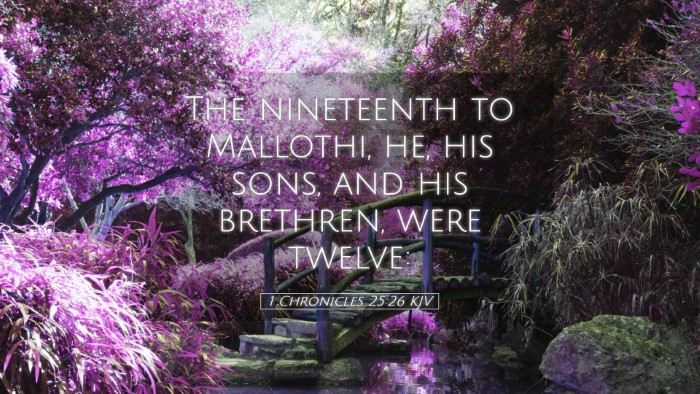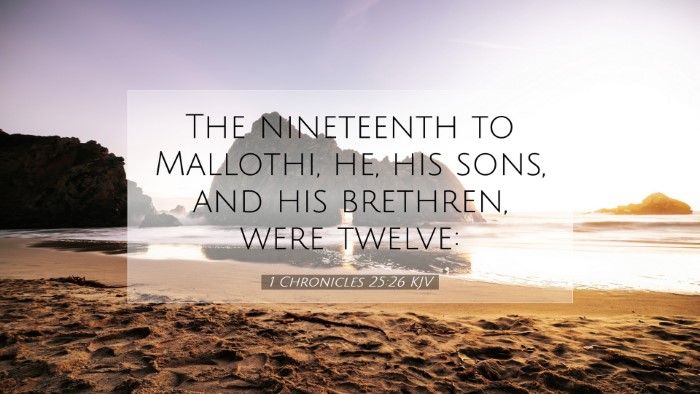Commentary on 1 Chronicles 25:26
1 Chronicles 25:26 discusses the division of the musicians (“the sons of Levi”) under the leadership of Asaph, Heman, and Jeduthun, who were responsible for leading worship and offering praises to God in the temple. This verse is part of a larger context concerning the organization of the Levitical order, particularly focusing on those who ministered in music.
Contextual Overview
The book of Chronicles, particularly 1 Chronicles, seeks to remind the Israelites of their heritage and the importance of worship in the temple. The Levitical priests, descendants of Aaron, were charged with sacred duties, including the musical aspects of worship which played a crucial role in both the spiritual and communal life of the Israelite people.
Insights from Public Domain Commentaries
Matthew Henry’s Commentary
Matthew Henry emphasizes the importance of the ministry of music and its impact on worship. He notes that the system of music laid out in this chapter signifies that “it is not only those of the priestly line that minister unto God but also the Levites, who engage in the service of the temple.” He suggests:
- The Role of Musicians: Musicians are called to be spiritual leaders in worship, influencing the congregation with their melodies.
- Divine Appointment: The distribution of musicians was a divine institution, set to enhance the feelings and expressions of worship.
- Cultural Heritage: The heritage of worship through music is a vital part of Israel's history and communal identity.
Albert Barnes’ Notes on the Bible
Albert Barnes provides a detailed look at the technical organization of the musicians and their duties. He states that:
- Establishment of Order: The appointment of leaders such as Asaph, Heman, and Jeduthun points to a structured approach that God endorsed for worship, ensuring excellence in offerings made to Him.
- Importance of Preparation: The singers and musicians were to be prepared and trained, demonstrating that the act of worship should reflect care and intention.
- Spiritual Vitality: Music is more than a decorative addition to worship; it serves as a medium through which the worshipers engage and express their devotion to God.
Adam Clarke’s Commentary
Adam Clarke draws attention to the concept of music surrounding worship not necessarily being about skill but also about sincerity and faith. He notes:
- Spiritual Intent: The heart of the musicians is crucial; thus, it is paramount for them to lead the congregation with sincerity rather than mere talent.
- Participation in Worship: The musicians served as an integral part of the people’s worship experience, illustrating that worship is communal and not solely an individual pursuit.
- Role of Inspiration: Clarke highlights the inspiration that accompanies worship music, influenced by the Holy Spirit, which helps to cultivate an atmosphere conducive to experiencing God.
Historical and Theological Significance
In examining 1 Chronicles 25:26, it’s important to place it within the historical context of post-exilic Israel, where the restoration of the temple worship was a priority. The musicians were not only tasked with enhancing worship but also with reclaiming the cultural identity of Israel through music.
Theological Implications
From a theological perspective, this passage indicates several profound truths:
- God's Design for Worship: God is intentional about how He is worshiped, emphasizing orderliness and reverence.
- Communal Worship Experience: Worship is meant to be a collective endeavor, where the community participates actively in the glorification of God.
- Valorization of Talent: The skills and talents of individuals in service to God are valuable and should be nurtured and utilized for edification.
Conclusion
1 Chronicles 25:26 serves as a potent reminder of the profound role that music plays in worship. The divisions and designations given to the Levitical musicians not only highlight the significance of worship in the life of Israel but also extend a timeless message to modern-day worshipers about the beauty and importance of engaging in music that glorifies God. As pastors, students, theologians, and scholars engage with this text, they are encouraged to reflect on their own worship practices, ensuring that they align with the spiritual intent that God desires from His people.


